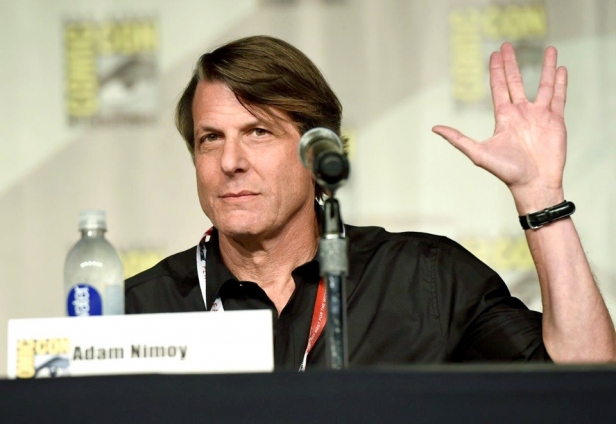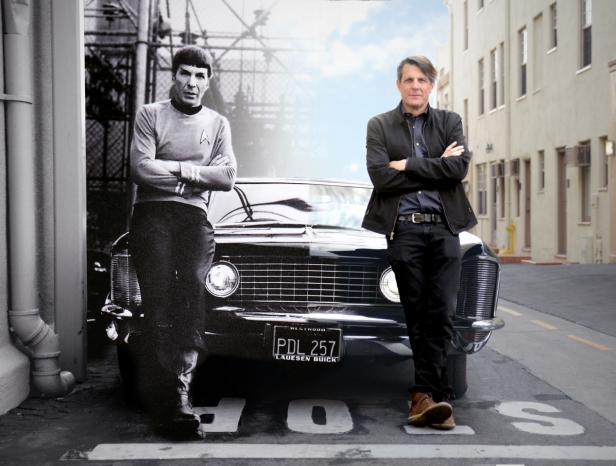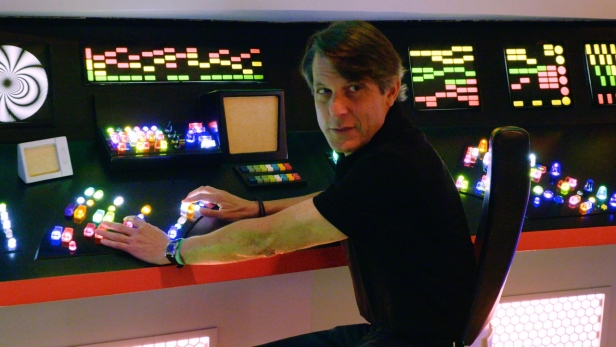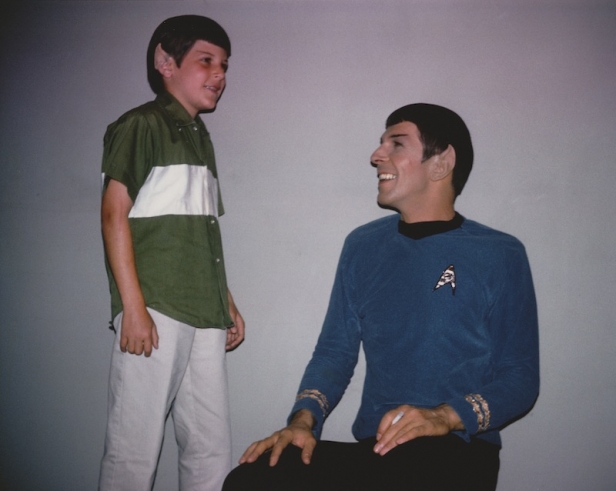The impact that Leonard Nimoy had on fans, popular culture and beyond cannot be overstated, both in character as Spock and out, so Star Trek fans cannot afford to miss out on For The Love Of Spock, the new documentary about his life and work, looking at his time both in front of and behind the camera. Directed by his son Adam, it’s an affectionate but honest portrait about the man, the character, and the legacy that both have left behind.
We spoke to Adam Nimoy about the origins of the project, the biggest surprises of making the documentary, and creating his own place in the Star Trek family.
So this originally started as a project that you and Leonard were working on this together?
Yeah, my father and I had made a short documentary film about his life growing up in Boston during the Depression and we had put that together in 2013, it had aired on television in 2014. I wanted to replicate that experience of working with him on something and I knew the 50th anniversary coming up. I approached him with an idea of creating something together to celebrate half a century of Mr Spock with the fans.
He was immediately interested in the idea, so much so that he Googled “Spock’s ears” and proudly reported to me that he had come up with 150,000 websites that referenced those ears! So he was very enthusiastic about getting into the project and reliving his memories of the creation of Spock, the evolution of Spock, and why Mr Spock has continued to resonate with fans all over the world half a century later.
But the thing that he wanted to make clear was that this was going to be a documentary only about Spock. My father was a man of great humility and didn’t want to include the life and wonderful career of Leonard Nimoy, so until he died the focus was going to be on a documentary that was solely about Spock. And that clearly had to change after he passed away.

(Photo by Chris Pizzello/Invision/AP)
The film really gets across just how much he invested in the creation of the character and brought to it.
Well, yeah, I’m often asked how much of Leonard is in Spock and vice versa. My dad brought a lot of his own personal experience to the role. This was something that we had talked about shortly before he passed away, he reminded me that Spock was the only alien on the bridge of the Enterprise, which made him the quintessential outsider, but the positive action for Spock was to integrate himself with his human colleagues, to bring what he had to offer as a science officer for the betterment of the mission and the group.
And that was very much reflective of his own life as a young man growing up in this very immigrant-heavy neighbourhood in the west end of Boston, which was all Italians, Irish and Russian Jews, and his whole objective was to find a way to integrate himself to a greater American society and to become more Americanised, because he had come from such an ethnic background. It was the ability to fuse those two experiences together which enabled him to create this dynamic inner life for Mr Spock. He otherwise could have been a very two-dimensional character but my dad brought so much of his own experience to the role.
There’s that moment where he’s talking about idolising Lon Chaney, the Man Of A Thousand Faces, and how important the make-up was to him.
The look of the character evolved over time, but this was the kind of thing that he was very comfortable with. He had played a number of Native Americans in westerns prior to this role, he had played a boxer in Kid Monk Baroni, his ideal was to be a character actor. Another one of his idols was a very famous character actor by the name of Paul Mooney who could play anything, this is really what he aspired to and Spock kind of fulfilled that.
He didn’t realise that he was creating a character that he would be recreating again and again for the rest of his life, that didn’t really occur to him at the time. But I think that’s why he was comfortable, at first he was very concerned that this could be a laughable character, this could be considered a joke, it could undermine his career, which he had taken very seriously. He was worried in the beginning, but as the character evolved at the time and the fans were reacting, I think he was able to more comfortably fill the role.

(Archive photo courtesy Nimoy Archive / CBS, Modern photo & artwork courtesy Kai de Mello / 455 Films)
What was the biggest surprise for you while working on this documentary?
I think the biggest most positive surprise was the interviews I had with the cast of this new JJ Abrams incarnation of Star Trek. In September of last year while they were filming Star Trek Beyond they were in Vancouver, and we took a camera crew up there and that’s where we interviewed everybody.
And the interesting thing that they all repeated was the impact that my father had on this new franchise, this new incarnation under JJ Abrams, that they really felt validated by his participation, and that even though he was no longer with them on the third instalment they very much felt his presence, his spirit, his inspiration was still very much resonating with them while they were making this film. And that was a really wonderful surprise for me to hear, the degree of the impact that he had on them.
It was amazing to see all the names of the Kickstarter funders! How was that process?
It was a nail biter for a while there! In the end we made it and it’s very gratifying that almost 10,000 supporters showed up and contributed to the financing of the film, which simply could not have been made without them.
It’s a community finance forum. It’s where people come together and share a common interest and a passion for the project, there’s a lot of people who feel passionate about my dad, and in turn what we’re creating is something for the community. This is a film that on the one hand collectively grieves for the loss of my father and bids him farewell, it’s a farewell note to him, a love note to him, but on the other hand, it’s also a celebration of the legacy he left behind, particularly with his most famous alter ego.
So it’s always been a community experience from the beginning right up to even now as we promote the film all over the world, audiences are coming out to celebrate the life and legacy of Mr Spock. It’s a wonderful experience.
How was it talking to the scientists and NASA personnel who were inspired by him?
My father heard this all of his professional career, people who came up to him in the engineering field, the medical field, space programme members, all telling him that it was him and the role of Spock that inspired him to pursue those careers.
So it’s been a fantastic experience to talk to these people about the impact that Spock has had in giving guidance to what they do with their lives. It’s really phenomenal. A lot of times these scientists would show their work to my dad and want his feedback and commentary, his stock phrase was that they’re on the right track and they should keep going! My father had a very fine mind and a very curious mind but very little formal education, he barely made it through high school, so it’s so interesting that Spock had such an impact in people in higher learning and post graduate education, it’s always fascinated me.

(Photo Credit: Kevin Layne / 455 Films)
In the film you go to your first Star Trek convention; what was that like?
I was at a convention for my father when he bid the fans goodbye, his last convention appearance was in Chicago 2011, I was there for that. But mostly I stayed away from conventions because I felt like I would be coming as Leonard Nimoy’s son and standing in his shadow. It screws with my own attempts to create my own identity and define who I am as an individual.
But going back to it for the first time, the annual convention in Vegas which I had never been to, when we were producing the film and again this year when we were promoting the film, it’s a different experience because I’m there for a reason, there’s a purpose for me being there. I’m not just the ambassador to the Nimoy family, I’m there in production on my film and I’m promoting my film and I feel like I have finally earned a place at the table of the Star Trek family of my own, that I have contributed something of value to this incredible phenomenon that is Star Trek and it’s a very different experience to just going there as Leonard Nimoy’s son, which I’m proud to be but it’s more in keeping with my own identity to have created something that is the reason for me being there other than just because of my father.
How was the experience of actually directing Leonard on The Outer Limits?
I loved collaborating with him. The Outer Limits was a very good experience, it was very early in my career. It was his idea to remake an episode that he had originally had a supporting role in and now he was going to be starring in. My dad agreed to be brought on board under that condition that I was attached as director. So it was a big boost to my career.
My dad and I worked on the story of that episode together, he’s very collaborative to work with on the set, still teaching me in a very respectful way, giving me comments about ways to shoot the scene, where to put the camera, these were things he would say to me in a private consult without instructing me in front of the entire cast and crew, so it was an extremely positive experience and an important episode in my career. After that episode I was able to secure agency representation and then able to find significantly more work. So a big pivotal point in my life and one of the highlights of my life with my dad when things were going good.
How have you found the reaction to the film so far?
Well, the response has been good. This film has been moulded and shaped with a lot of dedication over a good period of time, and the response seems to justify the work we put into it, because fans seem to be very positive. It’s very satisfying that the fan base has been overwhelmingly appreciative of what we’ve accomplished with this film.
It’s my first feature film and my way of saying goodbye to my father, it’s a way of honouring my father yet still telling the truth about the challenges of being in a celebrity family and being the son of Leonard Nimoy. Not a cakewalk of a job, it could be very difficult, we have two strong willed individuals who clashed but ultimately found themselves, reconnected with one another, and I had a very good and loving relationship with my dad.
So the film works on a number of levels and the reaction seems to reflect the fact that we were trying to achieve a number of themes on different levels. The Spock story, the legacy of Leonard Nimoy the artist, and the legacy of a father and son who had to work to reconnect and find each other, and it appears that we’ve succeeded on those levels so I’m very pleased.
Finally, what are you working on next?
We have a Deep Space Nine documentary, the producers that I’ve been working with had this in the works before they even partnered with me on this film, and now there seems to be a demand that we complete that project, so I’m consulting with them to get that film done.
We’ve also had a lot of contact with NASA about making a documentary involved with the manned mission to Mars. NASA is a big fan of Star Trek and they have a constant presence at Star Trek conventions and gatherings, and we as Star Trek family are constantly being invited to NASA gatherings because of the close symbiotic relation between the two. We’ve inspired each other. So the Mars mission is something that is of keen interest to me, it is related to space so there is still a Star Trek element to it but it’s something that I enjoy, it’s an interest that I have and it’s an opportunity that seems to be presenting itself to me so I’m intent on following through on that.
For the Love of Spock is showing as part of the 20th Anniversary UK International Jewish Film Festival on 16th November.
